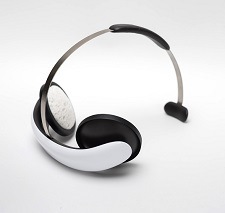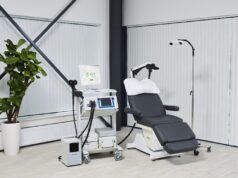
Flow Neuroscience, the creator of the Flow transcranial direct current stimulation (tDCS) headset for at-home, non-invasive brain stimulation to treat depression, has announced the results of its US Food and Drug Administration (FDA) pivotal clinical trial. The results show that the Flow headset was twice as effective as the most commonly prescribed antidepressants in the treatment of depression.
In a study of patients in the USA and UK—the largest ever clinical trial of its kind, according to Flow—56% of participants using the Flow tDCS headset were relieved of all depressive symptoms within 10 weeks. Daily use of Flow was confirmed to be safe with minimal side-effects as well.
Preliminary results from the trial include:
- The trial sites at the University of Texas (Austin, USA) and the University of East London (London, UK) measured the effectiveness and safety of the tDCS headset designed by Flow
- A total of 173 patients were taken through the at-home treatment programme, completely remotely and with minimal supervision, over a 10-week period
- Some 56% of patients in the treatment group went into remission (complete relief from depression symptoms), and 62% had a clinical response (more than 50% improvement in depressive symptoms), as measured by the Montgomery-Asberg depression rating scale (MADRS). The Hamilton depression rating scale (HDRS-17) was also measured, and results demonstrated 45% clinical remission and an improvement of ≥50% in 55% of patients
- The study showed that participants had greater than three times higher odds of getting substantially better if they got the active treatment versus placebo/sham stimulation—approximately double the average effect size witnessed in the trials for the 21 best-selling antidepressants reviewed by the US FDA
- No major side-effects were reported from the treatment group
The Flow tDCS headset and treatment is conveniently administered at home five times a week, creating an effective, safe and accessible treatment option for depression, as per a Flow press release. It uses tDCS to target the left dorsolateral prefrontal cortex, which is the area of the brain associated with depression, delivering a weak electrical current (2mA) via electrodes placed on the forehead and increasing activity in this part of the brain.
“These exciting and encouraging new data raise the prospect of a real advance in the treatment of depression,” said Allan Young (King’s College London, London, UK). “Major depression is undertreated throughout the world, and all of the currently widely used treatment modalities have significant limitations. The nature of this treatment, being both effective and well tolerated, means that it is a treatment which may be widely adopted and should be a helpful intervention for many people suffering from major depression.”
“These results show clear separation of active and sham treatment arms in a large, multisite, randomised controlled trial for at-home low-intensity brain stimulation for depression,” said Corey Keller (Stanford University, Stanford, USA). “Flow’s novel brain stimulation approach could offer valuable opportunities for individuals to manage their depression from home effectively, signalling a very promising development in mental health treatment.”
In July 2022, Flow received US FDA Breakthrough Device designation, becoming the first medical device in its category to achieve this status, and is now being reviewed for full FDA approval—which would make this technology available as an at-home treatment option in the USA. Flow has also already been granted regulatory approval in Europe, where it is available over the counter via Flow’s website and in major UK pharmacies.












